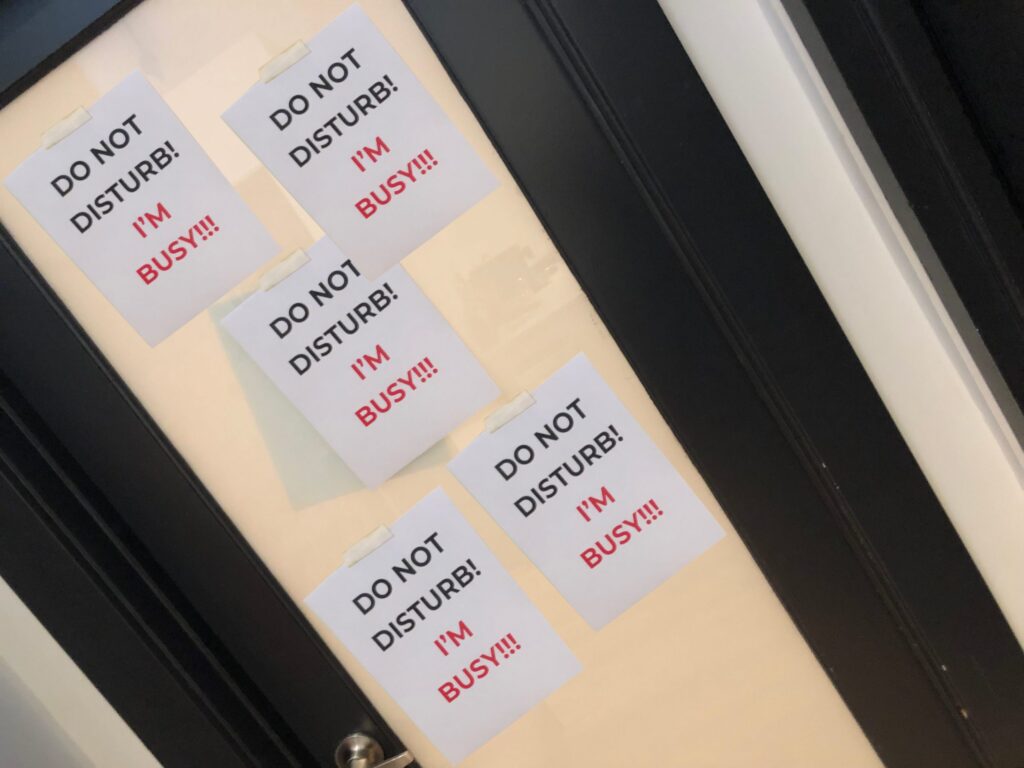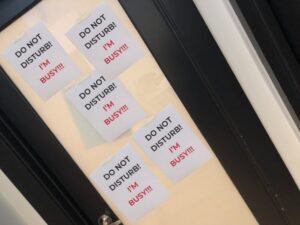Feb. 22, 2019

The “Too-Busy” Mindset and How It Affects Leadership
Most of today’s leaders are busy. They have too much to do, too many things on their plates, and too much going on. Even leaders who don’t necessarily have too many tasks on their To Do lists may artificially inflate their task list in an effort to appear more important than they already are. Being busy has become a status symbol and all too often, that busyness translates to a lack of time for employees within the organizational structure. Bosses sit behind closed doors, “too busy” to engage with their employees.
What if you challenged that culture and tried something different?
Today’s “too-busy” mindset has created a shift in the way employees deal with their employers. It leaves many employees feeling undervalued and underappreciated. By creating a shift in your company culture, you may discover that you’re able to more effectively manage your employees as well as creating a better work environment.
Making Time
In my office, I have an open door policy for ALL my staff. Unless I’m engaged in another meeting or phone call, I’m always available for my employees to come let me know what they’re dealing with. As a manager or business owner, I find that it’s very important to prioritize employee communication. As a result, I try to follow these rules in my office when there are issues that need to be handled:
Make it timely. If there’s an issue that needs to be dealt with, I try not to let it drag on. If you’re observing clear issues with your employees or an employee has indicated that they need to have a conversation with you, make the time for that conversation sooner rather than later. The longer you put off those necessary conversations, the more time things have to simmer and often complicate the situation.
Concentrate on the moment. Whatever it is that you’re doing when an employee comes to you with a serious issue, set it aside and pay attention to your employee’s concerns. Constantly checking your phone or continuing your work while they talk is disrespectful and may make employees feel as though their concerns aren’t valued. I never check my phone when I’m in meetings, I’ve always found this to be incredibly rude.
Give your employee time to talk. Don’t create the impression that you’re trying to rush them through the conversation. Instead, give employees a chance to talk for as long as they need within reason. While it’s important to set critical boundaries, you need to give employees time to share what they need to share, rather than feeling as though they’re being rushed back out of your office the moment you can get a word in.
Create opportunities to check in with employees. Don’t just talk to the employees who are eager to chat with you. Instead, look for chances to talk with employees who might otherwise continue their daily job tasks without checking in with you. Get to know your employees so that you can tell when something isn’t right. Learn more about their daily responsibilities, and their relationships with coworkers. This simple step can help you get a better feel for how things are going around the office on a regular basis.
Get out of your office. There’s something intimidating about walking into the boss’s office. Even the most seasoned employee may feel like a kid getting called back into the principal’s office and that’s not comfortable for anyone. Make opportunities to step outside of your office. Talk to your employees in their spaces: at their desks, where they work, or in communal areas. The more you opportunities you make to communicate with your employees outside your office, the more comfortable they’ll become with you and the more likely they will be to let you know when there are problems.
Setting Boundaries
I don’t mind communicating with employees when they need to talk, but it’s not always convenient. As I continue to run a successful agency, busyness comes with the territory, including important calls, tasks that must be taken care of, and an endless To Do list.
Employees are encouraged to respect my time. I’m glad to talk about the issues that are important, but when we’ve covered all of the relevant issues, I may encourage them to move on with their day. After all, we both have tasks that we need to take care of! Sometimes, talking about an issue isn’t enough to resolve it. Other times, we may need to collect more information and come back to it later. In either case, I try not to spend too much time on issues that aren’t that important or don’t have all the facts aligned, especially with all of the other tasks on my plate.
Non-urgent issues may need to wait. While I try to clear time in my schedule to deal with emergency conversations, there are times when a conversation can wait. When an employee’s issues don’t need immediate attention, I encourage them to set up a meeting with me sometime in the near future, when it’s convenient for both of us. That way, I can give them more of my time, energy, and attention. Employees are comfortable with the answer that I’ve given them, but also, I’m able to complete the things I need to do for the day.
I do have moments when I can’t set aside the time to chat. If I’m on a call or dealing with a client, employees know that they need to be respectful of my time. I’ll make time to talk with them as soon as I’m available, but they know not to interrupt at important moments and that’s a rule that’s strictly enforced throughout my company.
Today’s employees, more than ever, need to know that their contributions are valued and that their opinions and feelings are important to the company. Your time is valuable and your employees know it! When you’re willing to commit it to them, they understand that it showcases their importance to your company as a whole. Don’t let yourself become too busy for your employees. Instead, create a habit of opening your door and giving them the chance to come to you. You may be surprised by how much it can benefit your business! Have more questions or want to work with a company that prioritizes communication, engagement, and employee morale? Contact us today to learn more.
Book with us
Let’s accomplish what you are looking for, our team of experts are here for you.
Let's work togetherWarning: Working with our team may result in excessive creativity, uncontrollable 'aha' moments, and an addiction to perfect pixels. Please proceed with caution.



